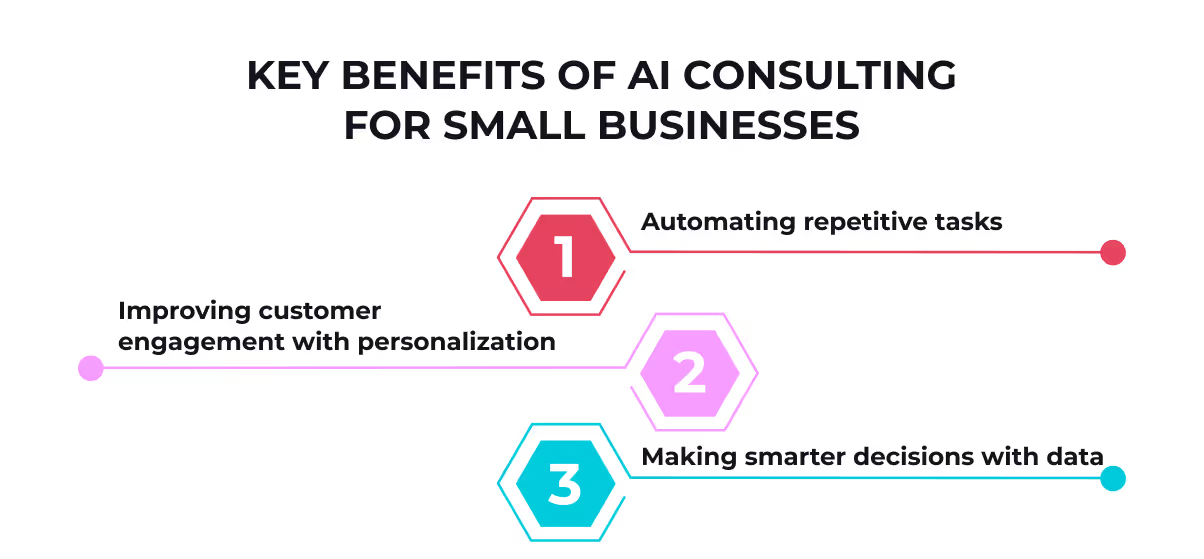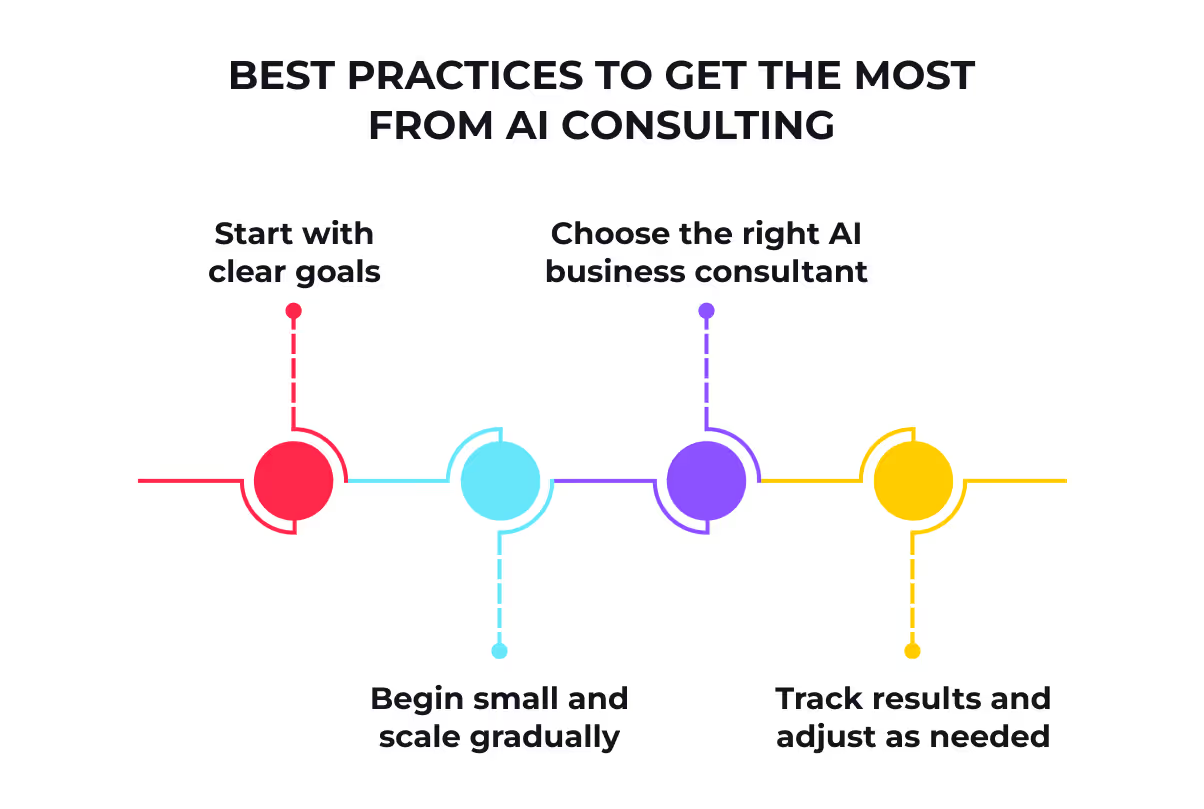
Discover how small businesses can boost profits, save time, and automate operations with focused AI consulting services. Learn what works — and talk to Darwin
Most of what you hear about ai consultancy services is complete nonsense.
Sure, artificial intelligence can help your small business compete with the big players, but it's not the magical cure-all that most intelligence consulting firms want you to believe. The truth? AI has finally become accessible and affordable for businesses of all sizes, but that doesn't mean every AI solution is worth your time or money.
Here's the thing — you don't need another complicated business solution cluttering up your operations. You need one that works. This guide cuts through the marketing fluff to show you exactly how the right AI consulting services can boost your ROI while helping you dodge the expensive mistakes that sink most AI projects.
Ready to separate AI fact from fiction? Let's get started.
The Importance of AI for Small Businesses in 2025
Small businesses form the backbone of our economy, making up around 90% of industry and generating nearly half of the global GDP. Yet most of these operations couldn't touch AI until very recently.
That's all changed in 2025.
Here's what the numbers actually tell us. Currently, 35% of businesses use AI "significantly" compared to only 22% in 2021. We're talking about a 64% jump in just a few years. But here's the kicker: 25% of small businesses have already woven AI into their daily operations, with over 50% actively exploring implementation – a 415% surge in AI usage in 10 years.
The message is crystal clear — AI isn't just for Silicon Valley giants anymore.
The results speak for themselves. Small business owners implementing AI report some pretty impressive wins: 82% saw better operational efficiency, 77% improved their ability to compete against larger firms, and 69% successfully fought off rising costs.
Here's what that looks like in the real world. AI software solutions can slash inventory management costs by up to 70% and cut maintenance downtime by 30%. For a small retail shop or service provider, these aren't just nice statistics — they translate directly into fatter profit margins and a stronger position in your market.
Think about it. While your competitors are still doing things the old way, you're operating with the efficiency of a much larger company, leveraging ai innovation to overcome common ai challenges.
Cloud-based solutions changed everything. Pay-as-you-go pricing means small businesses no longer need expensive agencies or complex infrastructure. AI consulting companies can now implement tools that integrate seamlessly with platforms you probably already use — Microsoft 365, Google Workspace, or your e-commerce platform.
As one small business owner put it: "What used to take me hours now takes minutes, giving me back time to focus on growth strategies and customer relationships".
This accessibility means an AI consulting agency can deliver solutions that were once reserved for enterprises with million-dollar budgets. The playing field just got a whole lot more level, with AI software development and AI education becoming more accessible to small businesses.

When small businesses partner with generative AI consultants, they unlock advantages that hit their bottom line hard. Nearly half of small businesses have started using AI tools in the past year alone, with 93% agreeing that these tools offer cost-effective solutions that boost profitability.
Picture this: you're drowning in email sorting, appointment scheduling, and inventory tracking. Sound familiar? AI excels at handling the boring stuff that eats up your day.
Machine learning models can automatically sort emails, transcribe calls, schedule appointments, or even restock inventory without you lifting a finger. That's 26 hours weekly you get back to focus on what humans do best — creative thinking and building relationships with customers who actually matter.
Your customers expect personalized experiences. Period. AI makes this possible even without a marketing team the size of Coca-Cola's. AI-enhanced CRMs analyze customer behavior, preferences, and interactions to deliver highly tailored experiences. Your small business can recommend products based on previous purchases or suggest personalized discounts that actually convert.
And here's the kicker: AI chatbots handle common customer queries 24/7. Studies show they can answer up to 80% of questions while reducing customer service costs by 50%. That's like having a customer service rep who never sleeps, never gets cranky, and works for pennies on the dollar.
Stop guessing. Start knowing.
AI turns raw data into actionable business intelligence. Instead of wondering what might work, AI shows you what will work. It identifies patterns in customer behavior, predicts future sales trends, and analyzes external factors like weather or local events to optimize your inventory. AI platforms give businesses of any size access to insights that used to require a dedicated data science team.
The financial impact? It's impressive. The median annual savings for businesses implementing AI solutions hits $7,500, with 25% reporting savings exceeding $20,000.
These savings come from multiple sources — reduced labor costs, fewer errors, streamlined operations, and optimized resource allocation. But here's what really matters: 80% of businesses using AI for marketing and sales see revenue increases, with 40% reporting gains of 6% or more.
That's not just cost savings. That's growth.
So you're thinking about hiring an AI consultant. Smart move — but what exactly are you paying them to do?
Here's the thing: A good AI consultant isn't just some tech person who shows up, installs software, and disappears. They're more like translators who bridge the gap between complex AI technologies and your actual business problems.
The best consultants start by getting their hands dirty with your operations. They'll dig into your business processes, poke around your data infrastructure, and figure out what's actually happening behind the scenes. This discovery phase isn't about showing off their technical knowledge — it's about understanding your real challenges, goals, and limitations.
A smart consultant will map out your workflows, check the quality of your data, and spot those bottlenecks where AI could make the biggest difference. Think of it as a business health check, but focused on where AI strategy consulting can actually help.
Once they understand your setup, consultants identify which AI solutions make sense for your specific situation. This requires deep knowledge of different technologies — from machine learning development to computer vision tools. But here's what separates good consultants from mediocre ones: They consider scalability, integration capabilities, and potential ROI before making any recommendations.
The goal? Matching technologies to your business objectives rather than pushing whatever AI solution happens to be trendy this month.
After you've chosen the right tools, consultants oversee the actual deployment and integration with your existing systems. They handle the technical heavy lifting — data preparation, AI model development, quality testing. Essentially, they turn theoretical AI strategies into working applications through AI solution development.
Many consultants also develop training programs for your team, making sure everyone understands how to use new AI tools effectively. Talk to Darwin about how implementation strategies can be customized for your specific business context.
Here's the part most businesses overlook: managing the human side of AI adoption. Approximately 48% of change management professionals already incorporate AI tools into their practices, yet nearly a third (29%) remain wary about adoption.
Good consultants address fears about job security head-on. They provide clear communication throughout the process and develop specific training programs to demystify AI. They understand that successful AI integration isn't just about technology — it's about bringing your people along on the journey through open communication and proper ai change management.
Because let's face it — the fanciest AI tool in the world won't help if your team refuses to use it.

Before you even think about calling an AI consultant, get brutally honest about what you're trying to achieve. What outcomes would make this investment actually worthwhile? Clearly defined objectives are crucial for keeping your AI initiatives focused and in line with your strategic goals.
Don't chase AI just because it's trendy. Instead, identify where it can genuinely move the needle — whether that's increasing user engagement, cutting costs, or boosting sales. The clearer your goals, the better your consultant can match solutions to your actual needs.
Not all AI consultants are worth your time. Look for specialists with proven success in your industry and expertise in technologies that actually matter for your business. Avoid anyone pushing generic, cookie-cutter approaches — your business deserves solutions built for your specific challenges.
The right partner brings clarity, guiding you toward AI applications that are both doable and impactful. Talk to Darwin about finding consultants who understand both the technical side and the business implications of AI implementation. You want someone who speaks your language, not just geek-speak.
Here's where most businesses mess up: they try to AI-ify everything at once. Smart approach? Start with focused pilot projects in specific areas — maybe customer service or inventory management — before expanding.
This lets you test what works, build your team's confidence, and gather solid evidence of value. Many small businesses find success by testing with one customer segment first, then scaling after they've proven the concept. Think of it as dipping your toe in the water before diving in.
Set up clear metrics before you implement anything. Labor hours saved? Customer response times? Error rates? Pick what matters most to your bottom line. Collect baseline data so you can measure real impact after deployment.
Here's a concrete example: if invoicing currently takes 10 hours weekly, and an AI tool cuts that to 4 hours, you've saved 6 hours weekly — that's approximately $720 monthly at $30/hour. These numbers make it easy to optimize your AI initiatives and show stakeholders exactly what they're getting for their investment.
So where does this leave you?
AI consulting isn't some distant future concept anymore — it's happening right now, and small businesses are getting real results. The numbers don't lie: businesses save nearly 26 hours weekly through smart automation, while 80% of companies using AI in marketing see revenue growth, with median annual savings hitting $7,500.
But here's what matters most: you don't need to become a tech expert to benefit. Start with clear goals, pick the right consultant for your industry, and test small before scaling up. Many business owners find that gradual implementation actually works better — it builds team confidence while proving value along the way.
The real question isn't whether AI consulting works for small businesses. It's whether you're willing to give your competitors a head start while you wait on the sidelines.
Your move.
Q1. How can AI consulting benefit small businesses?
AI consulting services can help small businesses automate repetitive tasks, improve customer engagement through personalization, make data-driven decisions, and reduce costs while increasing efficiency. It enables small businesses to compete more effectively with larger companies by leveraging affordable AI tools and technologies.
Q2. What does an AI consultant actually do for a small business?
An AI consultant performs an AI readiness assessment of the current business setup, recommends appropriate AI tools, assists with implementation and training, and supports change management and team adoption. They bridge the gap between complex AI technologies and specific business needs, ensuring that AI solutions are tailored to the company's goals and challenges.
Q3. How much can a small business save by implementing AI solutions?
The median annual savings for businesses implementing AI solutions is $7,500, with 25% of businesses reporting savings exceeding $20,000. Additionally, companies using AI report a 30% reduction in overall costs, and 80% of businesses leveraging AI for marketing and sales see revenue increases.
Q4. Is AI consulting only for large companies with big budgets?
No, AI consulting is no longer exclusive to large companies. Thanks to advancements in AI models and tools, artificial intelligence has become both accessible and affordable for businesses of all sizes. Small companies and startups can now achieve impressive results by strategically implementing smaller-scale AI solutions into their critical business processes.
Q5. What are some best practices for getting the most out of AI consulting?
To maximize the benefits of AI consulting, start with clear goals, choose the right AI business consultant with relevant expertise, begin with small pilot projects and scale gradually, and consistently track results to adjust as needed. This approach helps ensure that AI initiatives stay focused, aligned with business objectives, and deliver measurable value.
Q6. How can small businesses stay updated on AI trends and opportunities?
To stay informed about the latest developments in the ai consulting market, businesses can attend industry conferences, participate in AI education programs, and engage with AI technology consulting firms. This ongoing learning process helps increase ai awareness and ensures companies can leverage the most current ai software solutions and strategies.
Q7. What role does AI play in improving decision-making for small businesses?
AI plays a crucial role in enhancing decision-making processes by providing data-driven insights. Through AI solution design and implementation, small businesses can leverage advanced analytics and machine learning models to identify patterns, predict trends, and make more informed strategic decisions.
Q8. How do AI consultants help with AI tools selection?
Generative AI consultants assist businesses in choosing the most appropriate AI tools by assessing the company's specific needs, evaluating various AI software solutions, and recommending tools that align with the business's goals and budget. This process ensures that small businesses invest in AI technologies that offer the best return on investment and address their unique challenges.